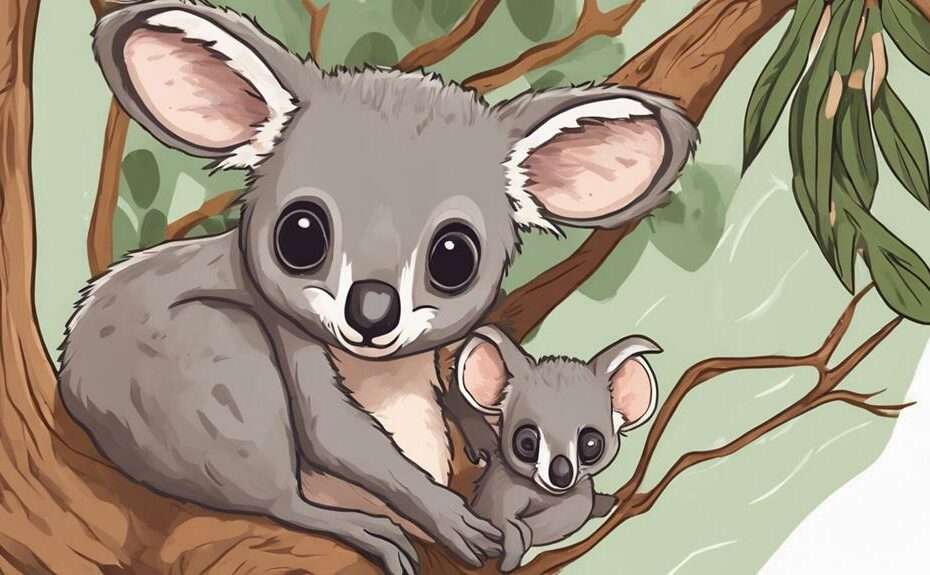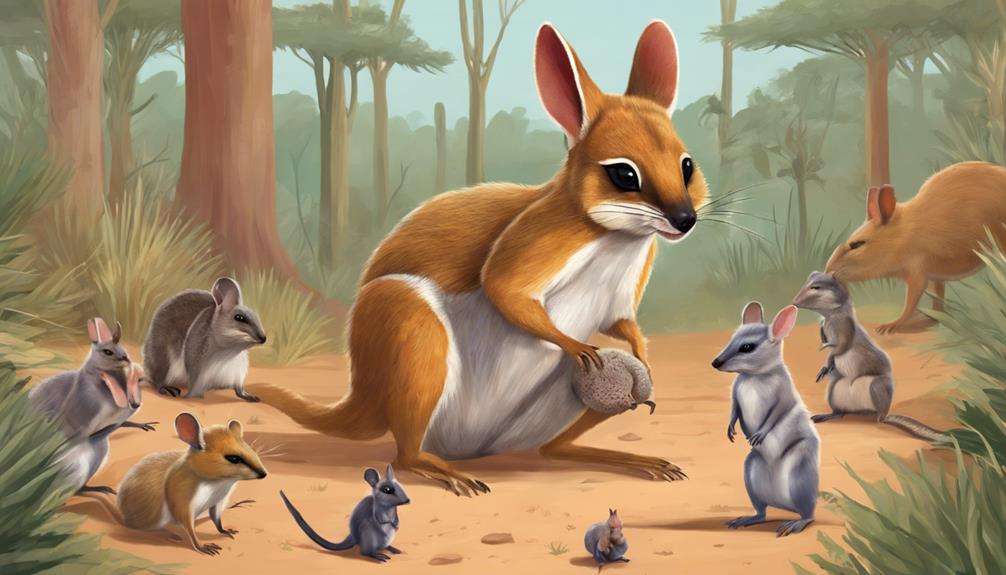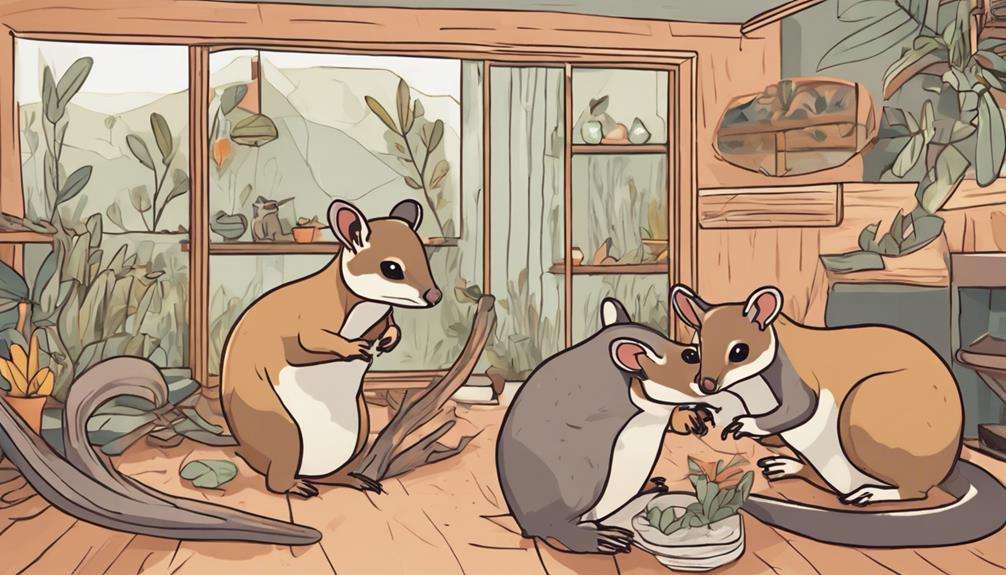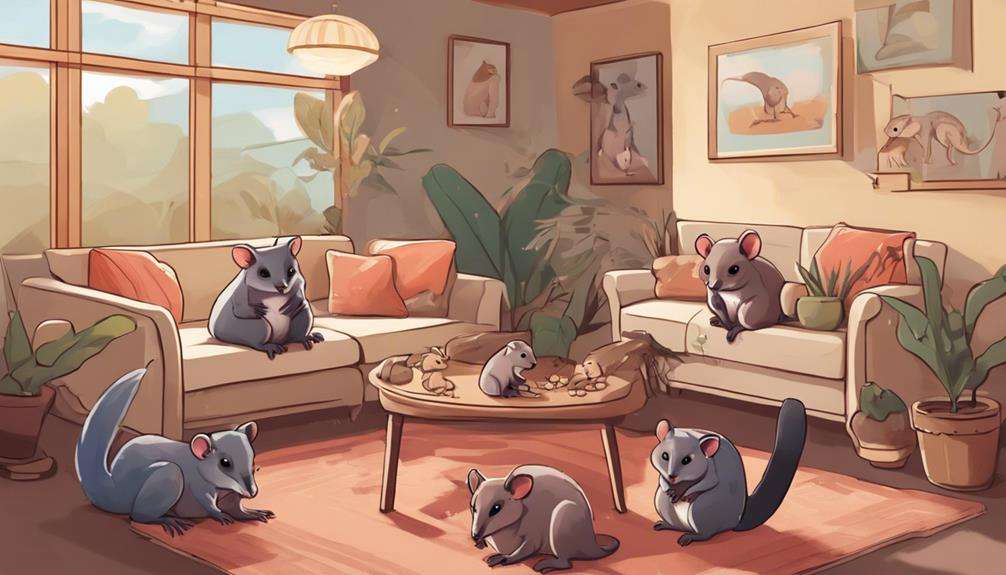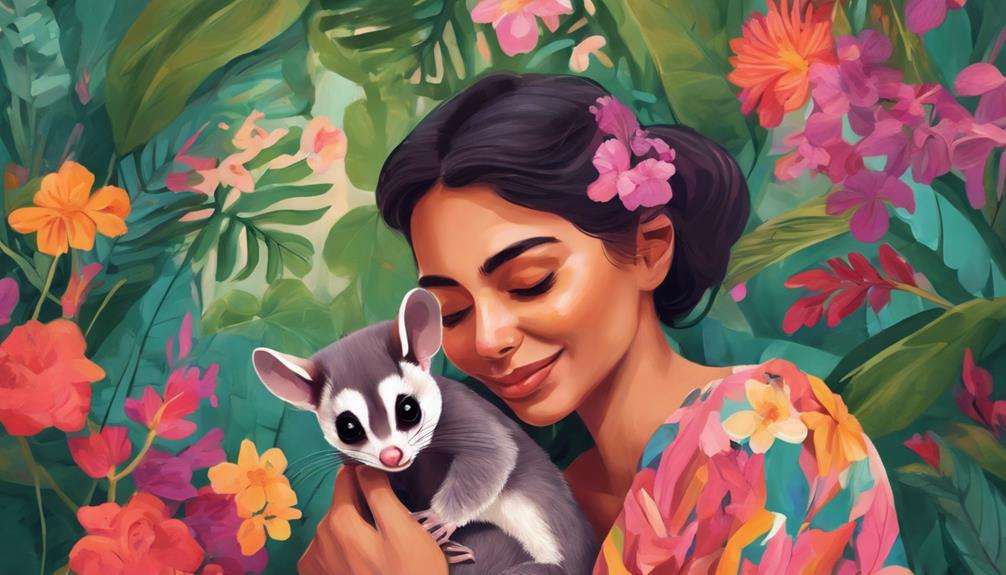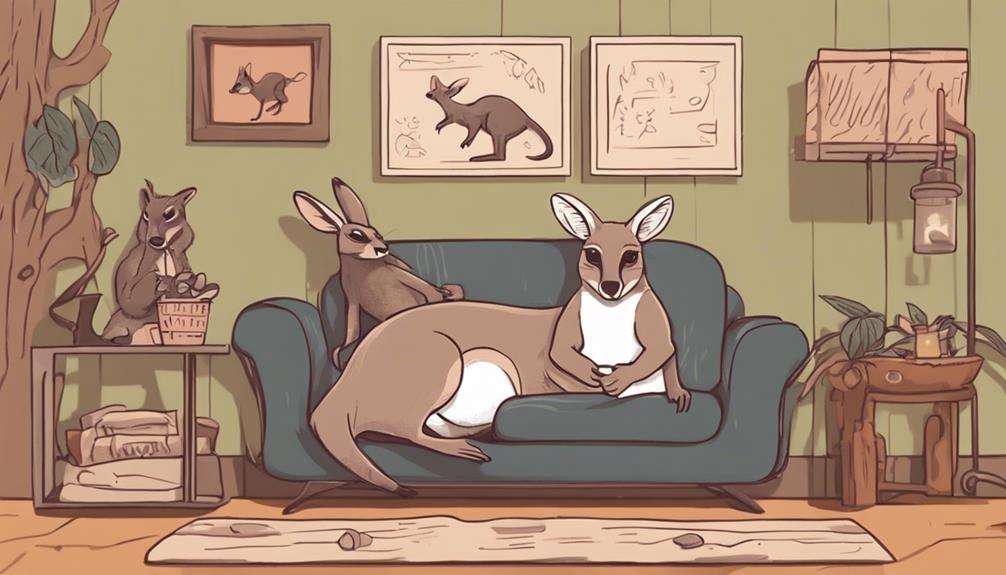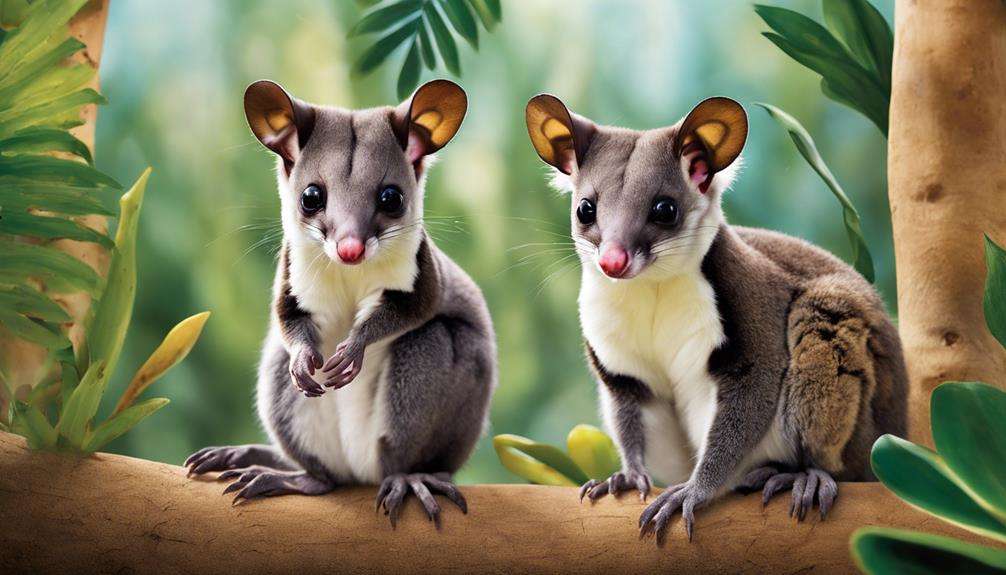If you've ever wondered about the appeal of having a marsupial as a pet, you're not alone. Sugar gliders, for example, are known for their endearing pouches and captivating behaviors that make them intriguing companions.
But before you make a decision, it's essential to understand the complexities involved in caring for these unique animals. From their specialized dietary needs to their social requirements, there's much to consider when contemplating marsupial ownership.
Stay tuned to discover the fascinating aspects of having a marsupial as a pet and the responsibilities it entails.
Key Takeaways
- Marsupials offer unique pet ownership experiences with their distinctive reproductive system and captivating traits.
- Their adaptability, exotic appeal, and uncommon species enrich life and enhance knowledge of exotic pet care.
- Bonding, group dynamics, and specialized care are essential for fostering strong relationships and ensuring marsupial health.
- Understanding legal considerations and expert care tips promote responsible ownership, conservation efforts, and a safe environment for marsupials.
Unique Qualities of Marsupials
Marsupials possess a truly remarkable and distinctive reproductive system where their young develop in a pouch after being born prematurely. This unique characteristic sets them apart from other mammals and makes them intriguing as pets.
One notable marsupial that has gained popularity as an exotic pet is the sugar glider. These small, nocturnal creatures with a gliding membrane between their limbs are captivating to observe. Their social nature and ability to form bonds with humans have made them sought after as pets in some regions.
When considering marsupials as pets, the opportunity to care for and interact with these fascinating creatures can be rewarding. However, it's essential to understand the specific needs of each species. Marsupials like sugar gliders require a specialized diet, spacious enclosures, and mental stimulation to thrive in a domestic setting.
Before deciding to bring a marsupial into your home, researching their care requirements and ensuring you can provide a suitable environment is crucial. Overall, the uniqueness of marsupials as pets adds an exciting dimension to the world of exotic pet ownership.
Marsupials' Adaptability as Pets
Considering the unique qualities and care requirements of marsupials like sugar gliders, their adaptability as pets stems from their small size, social nature, and intriguing characteristics. These factors contribute to why they can make excellent companions for pet owners seeking a unique and rewarding relationship.
Here are some key points that highlight their suitability as pets:
- Small Size: Marsupials, such as sugar gliders, are compact in size, making them well-suited for indoor living spaces and easier to care for compared to larger exotic animals.
- Social Nature: These creatures are highly social and thrive on interaction with their human companions. Their ability to form strong bonds with their owners adds to the joy of having them as pets.
- Intriguing Characteristics: From their gliding abilities to their nocturnal habits, marsupials offer a fascinating experience for those looking to have an unconventional yet fulfilling pet.
In essence, the adaptability of marsupials like sugar gliders as pets lies in their small size, social nature, and captivating traits, providing a unique pet ownership experience for those willing to meet their specific needs.
Exotic Appeal of Marsupials
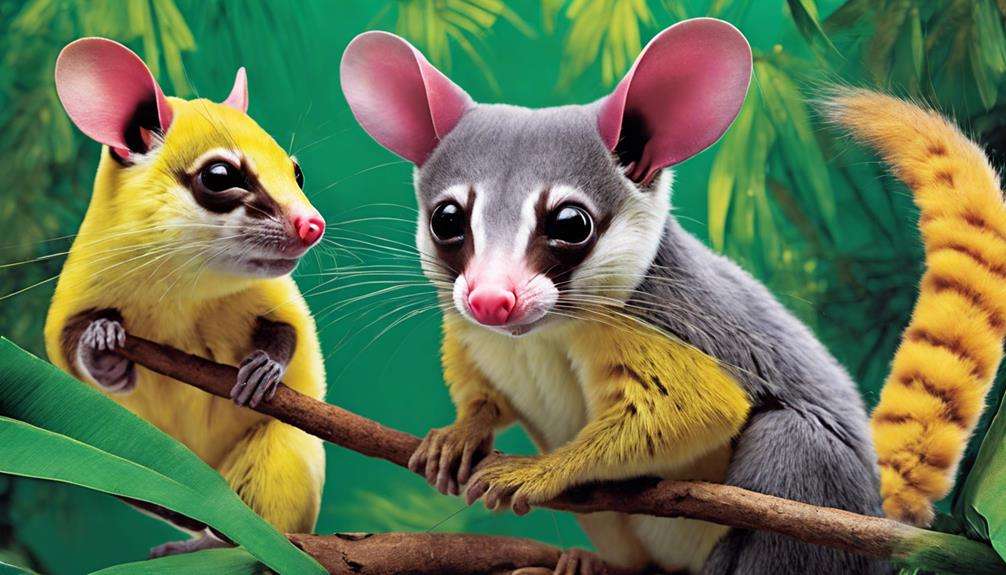
With their unique physical attributes and captivating behaviors, marsupials present an alluring exotic appeal to pet enthusiasts and animal lovers alike. Marsupials like sugar gliders have gained popularity in the US due to their endearing appearance and fascinating antics. The exotic charm of marsupials stems from features such as their pouches for young, diverse diet preferences, and distinct physical characteristics like gliding membranes and varied sizes. These traits make them stand out among traditional pets, drawing attention from those seeking a unique companion.
The nocturnal nature of many marsupials adds to their intrigue, as they showcase diverse locomotion styles and behaviors during the night. For instance, sugar gliders are known for their acrobatic movements and social interactions, making them a delight to observe. The wild instincts displayed by marsupials, including territorial marking and unique social structures, contribute to their exotic appeal, offering enthusiasts a glimpse into the fascinating world of these captivating creatures.
Benefits of Owning a Marsupial
Owning a marsupial can offer a unique opportunity to delve into the world of exotic pet ownership and appreciate the distinctive traits these creatures bring to your life. Marsupials, as pets, provide several benefits that make them stand out in the realm of exotic animals:
- Unique Animal Experience: Having a marsupial as a pet allows you to engage with a species that isn't commonly seen in the pet trade, offering a rare and intriguing animal ownership experience.
- Understanding Pet Care: Taking care of a marsupial offers insights into the specialized needs of these animals, from their pouch-dependent young to their specific dietary requirements, enhancing your knowledge of exotic pet care.
- Bonding and Companionship: Interacting with a marsupial can lead to a strong bond and rewarding companionship, demonstrating the value of responsible pet ownership and the joys of connecting with a unique animal species.
Owning a marsupial not only enriches your life with a fascinating companion but also opens the door to a deeper understanding of these extraordinary creatures.
Uncommon Marsupial Species for Pets
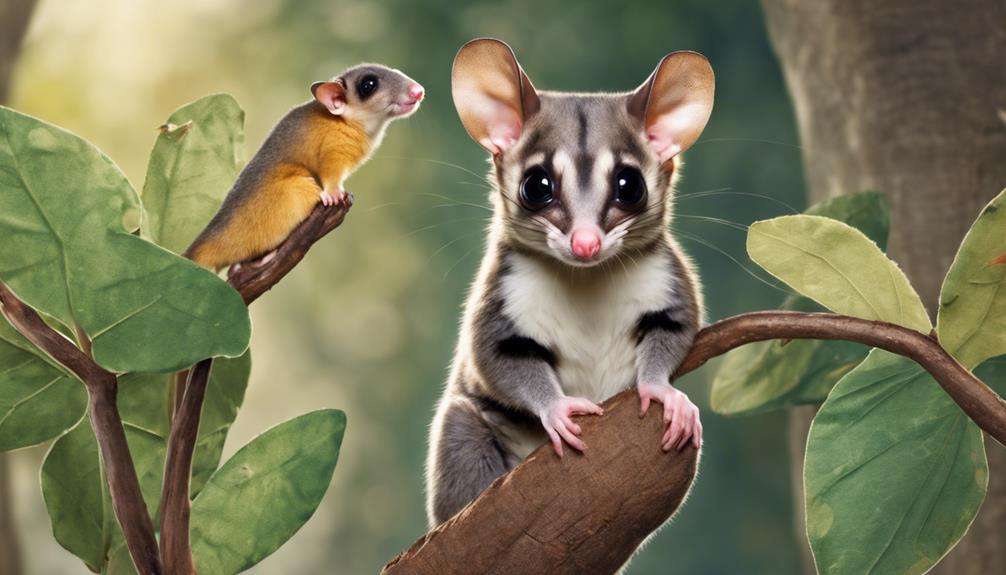
When considering uncommon marsupial species for pets, you open up a world of rare and distinct choices. These unique marsupials, like quokkas, quolls, and bilbies, offer a refreshing alternative to more conventional pet options.
Their individual characteristics and behaviors can provide a captivating and enriching experience for those seeking something out of the ordinary in pet ownership.
Rare Pet Options
Consider exploring uncommon marsupial species like sugar gliders, quokkas, bilbies, and gliders for unique and intriguing pet options. These lesser-known marsupials can offer a different experience for those looking to have a distinctive pet companion. Here are some rare pet options to consider:
- Sugar gliders: Known for their small size, gliding abilities, and social nature, sugar gliders are prone to forming strong bonds with their owners.
- Quokkas: With their friendly demeanor and unique smile, quokkas can bring joy and charm to any household.
- Bilbies and gliders: While less common, bilbies and gliders can also be fascinating additions to a pet owner's family, offering a unique perspective on marsupial companionship.
Unique Marsupial Choices
Exploring unique marsupial choices for pets can introduce you to a fascinating world of lesser-known species that offer distinctive characteristics and behaviors. While sugar gliders are popular, considering other options like quokkas, bilbies, quolls, and bettongs can bring novelty to your pet ownership experience.
Quokkas, known for their friendly appearance and social media fame, can be delightful companions. Bilbies, with their long ears and endearing hopping movements, offer a unique charm. Quolls, being nocturnal animals with striking fur patterns, bring an element of mystery and intrigue to your home. Bettongs, small marsupials that thrive in social settings, require specialized care and attention.
Providing these uncommon marsupials with a balanced diet of fruits and vegetables can help ensure their well-being and happiness.
Marsupials' Social Behavior in Captivity
When considering marsupials as pets, it's crucial to understand their social behavior in captivity. Marsupials, such as sugar gliders, form strong bonds with their owners through daily interaction, emphasizing the importance of social connections for their well-being.
Observing group dynamics among marsupials can provide valuable insights into their social needs and overall happiness in a domestic setting.
Bonding in Marsupials
Understanding the social behavior of marsupials, such as sugar gliders, is essential for fostering a strong bond between these animals and their owners in a captive setting. Regular interaction plays a crucial role in bonding with marsupials, like sugar gliders, as it helps establish trust and companionship. Social behavior in pet marsupials, such as sugar gliders, is a key component in ensuring their emotional well-being and overall development.
To enhance the bond with your marsupial pet, consider engaging in activities that promote social interaction, such as playtime and gentle handling. By catering to their social needs, you can create a fulfilling and enriching environment for your marsupial companion.
- Regular interaction is vital for bonding with marsupials like sugar gliders.
- Social behavior contributes significantly to the emotional health of pet marsupials.
- Activities promoting social interaction, such as playtime, strengthen the bond between owner and marsupial.
Group Dynamics Observed
To gain a deeper understanding of marsupials' social behavior in captivity, it's essential to observe the group dynamics exhibited among these animals. Marsupials display intricate social behaviors when kept in groups, forming strong companionships with both their human owners and fellow marsupials. By observing their interactions, one can witness how these creatures establish hierarchies, communicate, and provide support to one another.
Understanding group dynamics among marsupials in captivity is crucial as it not only mirrors their natural social structures but also enhances their mental well-being and overall quality of life. Providing companionship for marsupials plays a significant role in reducing stress, preventing loneliness, and promoting happiness. Therefore, observing and fostering positive group dynamics among marsupials is key to ensuring their mental and emotional health in captivity.
Challenges of Caring for Marsupials
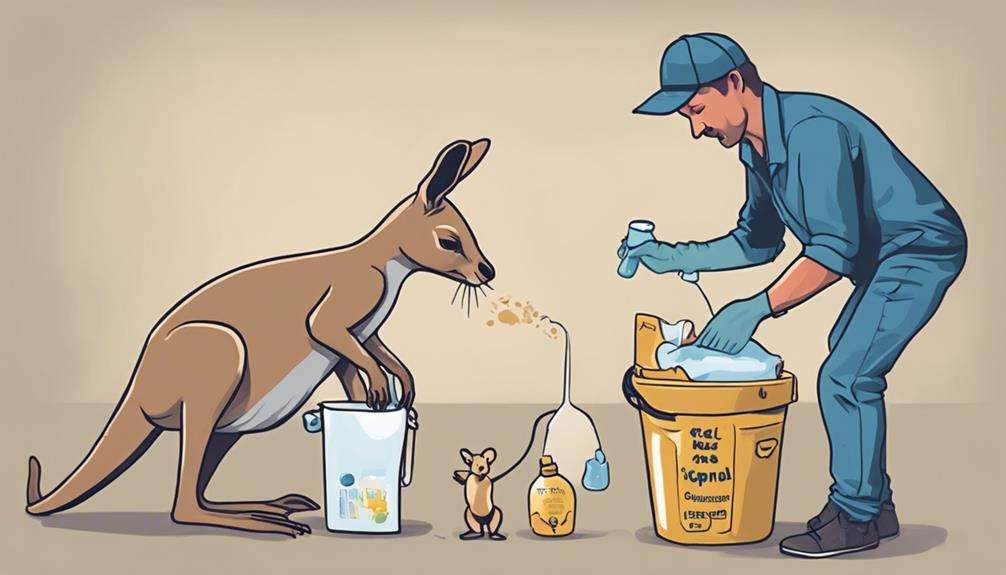
What challenges arise when caring for marsupials as pets?
Caring for marsupials like sugar gliders can present unique hurdles due to their specific needs and behaviors. Here are some key challenges to consider:
- Specialized Habitat Requirements: Marsupials have specific habitat and dietary needs that are crucial for their well-being. Replicating their natural environment, including providing a large cage with ample space for climbing and exercise, can be demanding.
- Reproductive and Developmental Care: Their unique reproductive system, such as the pouch for carrying young, necessitates specialized care and attention to ensure proper development.
- Socialization and Enrichment: Marsupials are highly social animals that require interaction and mental stimulation to thrive. Failing to provide adequate enrichment and socialization can lead to stress-related behaviors and health issues.
Successfully caring for marsupials as pets involves understanding and addressing these challenges to provide them with a safe, healthy, and enriching environment.
Legal Considerations for Marsupial Ownership
When considering ownership of marsupials, it's essential to be well-informed about the legal considerations surrounding their care and possession. Marsupials, such as the sugar glider, are protected by laws and regulations aimed at preventing exploitation and ensuring their welfare. Legal aspects of marsupial ownership often involve obtaining permits, licenses, and adhering to restrictions rooted in conservation concerns and animal welfare principles. It's crucial to note that some states or countries may impose bans on owning specific marsupial species to protect their populations and habitats.
Failure to comply with the legal requirements for owning a marsupial can lead to consequences such as fines, confiscation of the animal, or legal actions against the owner. Understanding and abiding by the laws related to marsupial ownership is paramount to promote responsible pet ownership and contribute to the preservation of these unique creatures. Before bringing a marsupial into your home, ensure you're well-versed in the regulations governing their ownership by consulting relevant authorities or resources like the Animal Hospital and Privacy Policy guidelines.
Expert Tips for Marsupial Pet Care
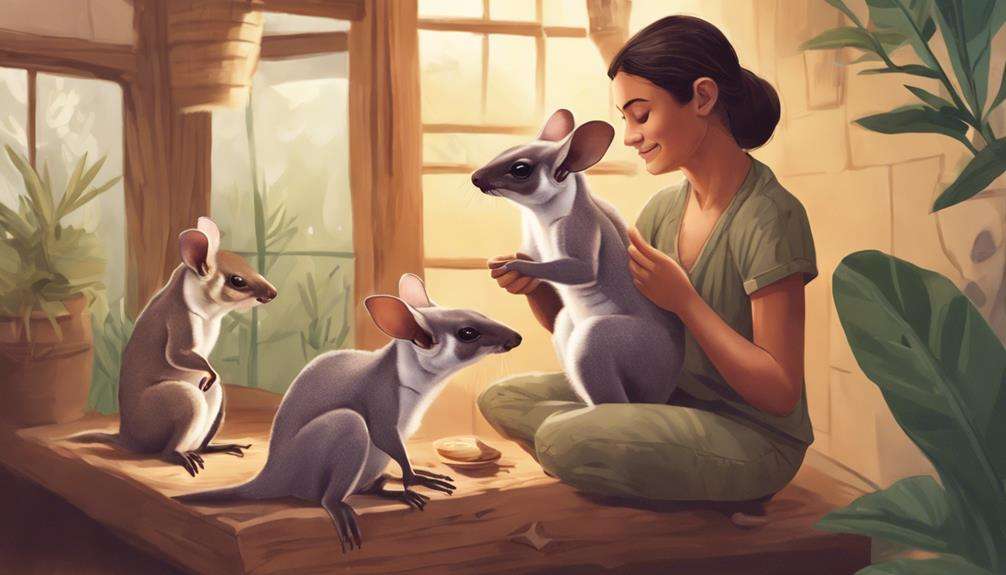
Consider enhancing the well-being of your pet marsupial by implementing expert tips for their care. When it comes to keeping a sugar glider healthy and happy, here are some key points to consider:
- Provide a spacious, secure enclosure: Sugar gliders are active animals that love to climb and explore. Set up a habitat with plenty of climbing structures and hiding spots to mimic their natural environment.
- Offer a balanced diet: A diet rich in fruits, vegetables, insects, and specialized commercial feeds is essential for your sugar glider's health. Ensure they've access to a variety of foods to meet their nutritional needs.
- Regular veterinary check-ups: To ensure the well-being of your sugar glider, schedule regular visits to a veterinarian experienced in exotic pets. Monitoring their health through check-ups can help catch any potential issues early on.
Frequently Asked Questions
Can You Have a Marsupial as a Pet?
Yes, you can have a marsupial as a pet. Consider bonding benefits, care requirements, and legal considerations. Ensure proper permits, a large cage, varied diet, and social interaction for their well-being. Check local laws before adopting.
Why Are Marsupials Considered Mammals?
Marsupials are considered unique mammals due to their reproductive strategy. They give birth to live young, nurse them with mammary glands, and have fur on their bodies. These characteristics align them with other mammals.
Are There Any Domesticated Marsupials?
You can't legally have domesticated marsupials. They require specialized care due to their unique behaviors. Conservation efforts focus on their well-being in the wild. Marsupials aren't like cats or dogs; they're wild creatures.
What Makes Marsupials Special?
Marsupials possess unique characteristics like pouch parenting, making them special. Their exotic companionship offers a distinctive pet experience. Understanding their value in ecosystems and conservation efforts is crucial. Researchers study them for insights into evolutionary biology.
Conclusion
In conclusion, considering marsupials as pets can provide a unique and rewarding experience for those willing to put in the time and effort to care for these fascinating creatures.
While challenges may arise, the bond formed with a marsupial companion can be truly special.
By understanding their needs, behavior, and legal requirements, you can create a fulfilling and enriching relationship with a marsupial pet.
So, if you're up for the challenge, owning a marsupial could be a truly rewarding endeavor.
